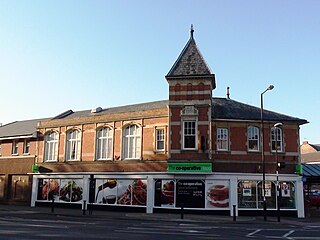In British politics, an affiliated trade union is one that is linked to the Labour Party. The party was created by the trade unions and socialist societies in 1900 as the Labour Representation Committee and the unions have retained close institutional links with it.

The Transport and General Workers' Union was one of the largest general trade unions in the United Kingdom and Ireland – where it was known as the Amalgamated Transport and General Workers' Union (ATGWU) to differentiate itself from the Irish Transport and General Workers' Union – with 900,000 members. It was founded in 1922 and Ernest Bevin served as its first general secretary.
The Co-operative Party is a centre-left political party in the United Kingdom, supporting co-operative values and principles. Established in 1917, the Co-operative Party was founded by co-operative societies to campaign politically for the fairer treatment of co-operative enterprise and to elect 'co-operators' to Parliament. The party's roots lie in the Parliamentary Committee of the Co-operative Union established in 1881.
The Union of Shop, Distributive and Allied Workers (Usdaw) is a trade union in the United Kingdom, consisting of over 360,000 members. Usdaw members work in a variety of occupations and industries including: shopworkers, factory and warehouse workers, drivers, call centres, clerical workers, milkround and dairy process, butchers and meat packers, catering, laundries, chemical processing, home shopping and pharmaceutical. The retail sector employs around 2.77 million people.

The Ceramic and Allied Trades Union (CATU) was a trade union representing pottery workers in the United Kingdom.
The United Kingdom is home to a widespread and diverse co-operative movement, with over 7,000 registered co-operatives owned by 17 million individual members and which contribute £34bn a year to the British economy. Modern co-operation started with the Rochdale Pioneers' shop in the northern English town of Rochdale in 1844, though the history of co-operation in Britain can be traced back to before 1800. The British co-operative movement is most commonly associated with The Co-operative brand which has been adopted by several large consumers' co-operative societies; however, there are many thousands of registered co-operative businesses operating in the UK. Alongside these consumers' co-operatives, there exist many prominent agricultural co-operatives (621), co-operative housing providers (619), health and social care cooperatives (111), cooperative schools (834), retail co-operatives, co-operatively run community energy projects, football supporters' trusts, credit unions, and worker-owned businesses.
Community is a British trade union which formed in 2004. The union represents workers in a diverse range of sectors, including iron and steel, justice and custodial, domestic appliance manufacturing, textiles and footwear, road transport, betting, the third sector, education and early years as well as the self-employed.

A consumers' co-operative is an enterprise owned by consumers and managed democratically and that aims at fulfilling the needs and aspirations of its members. Such co-operatives operate within the market system, independently of the state, as a form of mutual aid, oriented toward service rather than pecuniary profit. Many cooperatives, however, do have a degree of profit orientation. Just like other corporations, some cooperatives issue dividends to owners based on a share of total net profit or earnings ; or based on a percentage of the total amount of purchases made by the owner. Regardless of whether they issue a dividend or not, most consumers’ cooperatives will offer owners discounts and preferential access to good and services.

The Modern Records Centre (MRC) is the specialist archive service of the University of Warwick in Coventry, England, located adjacent to the Central Campus Library. It was established in October 1973 and holds the world's largest archive collection on British industrial relations, as well as archives relating to many other aspects of British social, political and economic history.
The National Association of Operative Plasterers (NAOP) was a trade union representing plasterers in the United Kingdom.
Anglia Regional Co-operative Society Limited was the fifth largest consumer co-operative in the United Kingdom. It was formed by the merger of the Greater Peterborough Regional and Anglia co-operative societies in 1987. The Society had over 80 stores, principally trading in East Anglia. Head office was located at Westgate House, Peterborough until 2011.
Central England Co-operative, trading as Central Co-op, is a regional consumer co-operative in the United Kingdom, based in Lichfield and which trades from over 400 sites across the English Midlands and East Anglia. The business is owned and democratically controlled by its members who can stand for election to the board and who also share in the society's profits. A proportion of the profits of the business are also invested in local community groups through its community dividend grants programme and its more than 60 member classes.
The National Amalgamated Union of Shop Assistants, Warehousemen and Clerks was a trade union representing retail workers in the United Kingdom.
The Amalgamated Textile Warehousemen's Association was a trade union representing workers in the textile industry in the United Kingdom, principally in Lancashire.
The National Union of Textile Workers was a trade union representing workers in the textile industry in England, principally in Yorkshire.
The Amalgamated Union of Co-operative Employees (AUCE) was a trade union representing retail and related staff of co-operative businesses in the United Kingdom.
The Irish National Union of Vintners', Grocers' and Allied Trades Assistants (INUVGATA), also known as the Barmen's Union, was a trade union representing retail and bar staff, principally in Ireland.
Alfred W. Burrows was a British trade unionist.
The National Society of Dyers and Finishers was a trade union representing textile dyers and related workers in the United Kingdom, principally in northern England.
Paddy Lillis is a trade union leader from Northern Ireland.




